
The rare moment when every vote counts at China’s party congress
The selection of the country’s ruling elite might seem like a rubber stamping exercise, but the party’s rank and file are not without influence, insiders say
While the election process for China’s ruling elite is unlikely ever to be held up as a bastion of democracy, for the delegates at next week’s 19th National Congress it does at least provide an opportunity to have a small say in who they think should stay and who should go.
About 2,300 people will attend the twice-a-decade event, which opens on Wednesday and where one of the main orders of business will be the election of the 200-plus members of the party’s Central Committee.
There remains the possibility for disappointment and upset, as the candidates are listed by the number of votes they receive.
Five years ago, Ling Jihua – despite once being a right-hand man to then President and General Secretary Hu Jintao – suffered the humiliation of receiving the fewest votes of the 205 people elected to the committee.
“I remember there was uproar among the delegates … when it was announced that Ling had received the fewest votes,” a party congress delegate five years ago, who asked not to be named, told the Post.
“It was awkward and humiliating [for him],” he said.
While the decision might not have been a surprise to everyone – three months earlier Ling had been removed from his position as director of the General Office of the Central Committee – it certainly sent ripples around the Great Hall of the People in Beijing, according to one of the people who was actually there.
The candidate said: “We voted by elimination...We might not have the final say, [but every vote] does carry some meaning.”
A shortlist of candidates is produced by an electoral committee known as the presidium, this always exceeds the number of positions available, so delegates are given the rare opportunity to vote for their favourites, which they do by “eliminating” those they like least.
There are usually two rounds of voting. In the preliminary round of voting – held at the start of the congress – each delegate nominates his or her least favourite candidates. The number of people they have to select depends on how many more candidates there are than seats available on the central committee.
The ballots are then tallied and those candidates with the most votes are eliminated from the contest.
The aim of the preliminary vote is to whittle down the number of candidates so that it exactly matches the number of seats available. A final vote is then held at the end of the congress in which all of the remaining candidates are guaranteed a seat on the central committee.

Although Ling retained his position on the Central Committee by the narrowest of margins, the rank and file had made it clear how they felt about Ling. His card had been marked and his future was sealed.
A subsequent legal investigation found him guilty of illegally obtaining state secrets and abuse of power, and in July last year he was sentenced to life imprisonment.
But Ling is far from being the only one-time high-flyer to have had his wings clipped at a national congress.
Another party veteran told the Post how former party propaganda chief Deng Liqun also fell foul of the popular vote.
Deng failed to be voted on to the Central Committee at the 13th national congress [in 1987] even though he had been preselected to join the Politburo by party veterans before the meeting. At the time there was only one round of voting.
Deng was known for his ruthless purge of liberal intellectuals throughout the 1980s and for being a strong critic of then paramount leader Deng Xiaoping’s reform policies.
Similarly, in 1992, five years after Deng Liqun came to grief, Xiao Yang, then party boss of Chongqing – which although not the metropolis it is today was still a significant city – also failed to secure enough votes to land a place on the Central Committee. Before that year’s congress, he had been slated to become an alternate member of the powerful Politburo.
Time will tell if there are any major surprises or upsets at this year’s event, but one thing is certain, the assembled delegates will not be without a voice.

